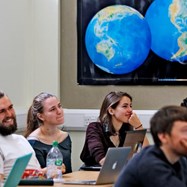Russell Group universities are pulling in the same direction to tackle climate challenges
09 December 2019
Joanna Burton, Policy Manager at the Russell Group, writes about the joint statement on environmental sustainability published today by the Russell Group. The full statement can be found here.
Climate change and environmental sustainability are some of the most pressing global challenges facing the world today.
As some of the largest universities in the UK, we not only have a responsibility to show leadership and play our part in the global response to climate change, but are uniquely placed to help deliver a more sustainable future for all – through world-class teaching and research, as well as more sustainable practices.
To support and enhance their efforts, a new Environmental Sustainability Network has been established to take a strategic look at opportunities for Russell Group universities to work together and have an even greater impact.
It starts with what we teach. The future will be in the hands of young people, and all universities know there is demand from students to learn more about climate and environmental issues through their studies. Russell Group universities teach a quarter of all undergraduates in the UK. All 24 of our universities have worked with their students to ensure every single one has access to a range of opportunities to learn about sustainability, for example through student-led societies, Green Impact projects and volunteering opportunities.
Course curricula at Russell Group universities are informed by the latest research from leading experts. Even if students aren’t on a course directly linked to climate or the environment, many universities have specific modules on sustainability which are open to all students. Our universities are now working together to explore how they can do more to weave environmental sustainability throughout the whole university experience.
The scientific reality of climate change cannot be ignored. Researchers have discovered we are running the risk of irreversible damage to the planet, while protestors and activists have played an important role in giving a greater platform to this evidence. This has grabbed the attention of world leaders, and the Government has recently committed to a set a target of 2050 for net zero greenhouse gas emissions.
The solutions to achieving net zero, and to address many of the challenges posed by climate change, will be delivered through cutting-edge science and technology. Researchers at Russell Group universities are already leading the way on a range of issues to understand and mitigate the impact of a changing environment and reduce our global carbon footprint. This includes food security, flood prevention, clean energy, materials science, and air pollution. Behavioural and social scientists are also critical in helping us understand how societies can adapt to these changes.
But we recognise that as well as being a powerful force for change in the classroom and the laboratory, other actions matter too. As major employers and a core part of our local communities, it is crucial universities themselves take the lead in operating in a more environmentally friendly manner.
Emissions targets and carbon reduction plans feature heavily in universities’ strategies for improving sustainability and a wide range of initiatives are already being implemented, from improving building efficiency to sustainable supply-chain management. While targets may vary between universities, all take responsibility for measuring and managing carbon emissions and are working hard to meet their targets.
Aside from this, our universities are making changes to limit their environmental impact. On campuses across the UK, they are doing more to recycle and reduce plastic, introduce vegetarian and vegan food options, save energy and water, and encourage green travel.
There is no quick fix or perfect solution to the challenges our planet faces. For universities responding to these issues, there are difficult decisions and trade-offs to be made.
There will inevitably be challenges when embedding sustainable practices in more complex areas, such as business air travel and procurement. But through the Russell Group’s new Environmental Sustainability Network, our universities now have a platform to share best practice and to find new ways to overcome these hurdles.
As large, research-intensive and highly internationalised universities, we have to acknowledge our research and education activities generate an inevitable impact on the environment. For universities with international business models, global research collaboration and recruitment of international students are essential. However, we should not be afraid to say that the work our universities undertake also adds significant value to society and the environment. Indeed, it has the potential to be transformative in the long-term.
Russell Group universities are committed to pulling in the same direction to do more to tackle environmental and climate challenges. Change will not happen overnight, but through working together, our universities are determined to lead the way in making a difference to the future of our planet.
-
Hamir Patel
hamir.patel@russellgroup.ac.uk
020 3816 1316
-
Joanna Burton
joanna.burton@russellgroup.ac.uk
020 3816 1322
 X
X


